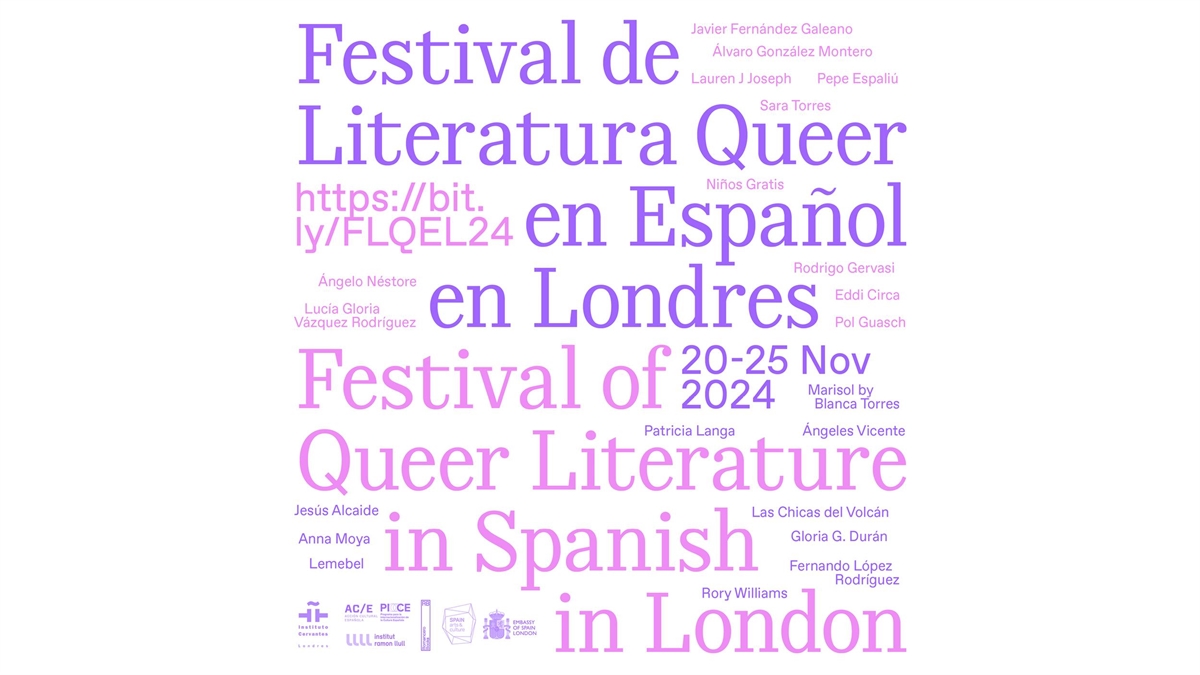Conference at the Cervantes Institute – organised in collaboration with SRUK/CERU

- This event has passed.
Conference at the Cervantes Institute – organised in collaboration with SRUK/CERU
November 21 @ 7:00 pm - 8:30 pm GMT

Romancero Books with the support of the Office for Cultural and Scientific Affairs of the Spanish Embassy in London and AC/E Programme for the Internalisation of Spanish Culture presents the IV Festival of Queer Literature in Spanish in London – FQLSL
Conference at the Cervantes Institute – organised in collaboration with SRUK/CERU
on research conducted by Spanish researchers with collaboration with UK Universities
Anna Moya (LSE): Epistemic injustice and obstacles in the reception of queer research in the UK.
Álvaro González Montero (Leeds): Sexual dissent during Francoism and homosexual literature in Gil de Biedma.
Lucía Gloria Vázquez Rodríguez (UCL): Forms of queer representation of desire in Latin American cinema made by women.
Javier Fernández Galeano (UV/Wesleyan): Monograph on the history of queer erotic
Abstracts of the conference:
Who’s Listening to the Queer? Epistemic Injustice in Contemporary Academia.
How is knowledge produced from a body that deviates from the ideal of the knower? What resistances emerge when working from the margins of disciplines, and how are these obstacles navigated in the pursuit of an epistemic order that allows for the coexistence of different ways of approaching the world? This research delves into the literature on epistemic injustices and the experiences of doctoral students in UK universities to highlight the universalist and value-free pretensions of certain epistemologies as a central mechanism in the inferiorization of queer and feminist studies. It also explores how epistemic resistance is sustained through intergenerational solidarity networks and the creation of subversive spaces where queer and feminist voices can flourish.
A diary to precipitate events: sex and sexuality in David Vilaseca’s and Jaime Gil de Biedma’s diaries.
Personal diaries are a genre that is in tension with the notions of publicness and privacy. It seems to promote the expression of one’s private world, although many authors, such as Vilaseca or Gil de Biedma, write them with the idea of publishing them posthumously. Thus, both authors experiment with the expression of their sexuality in their diaristic work. In this presentation, I show the key points for sexual expression through these two authors’ diaries, emphasising, on the one hand, their queer character, that makes the two writers refuse any fixed form of sexuality. On the other hand, I establish the importance of diaristic writing as a source for the research of dissident sexualities.
20,000 Species of Bees (Estibaliz Urresola, 2023): A Different Perspective on Trans Childhoods
This presentation analyses the representation of trans childhood in the film 20,000 Species of Bees, directed by Estibaliz Urresola and framed within the “other new Spanish cinema directed by women,” among whose exponents are the award-winning Carla Simón and Pilar Palomero. Through an audiovisual language that emphasizes the sensory and the affective, the film offers a sensitive and profound vision of the trans experience in childhood, highlighting the agency of its protagonist and the importance of establishing queer communities. The film invites a reflection on identity and acceptance through a visually immersive and emotionally resonant narrative with clear stylistic markers from its autese.
Queer Obscenity. Erotic Archives in Dictatorial Spain.
Under Spain’s twentieth-century dictators, state agents not only censored, eradicated, and attempted to prevent the circulation of obscenity, but also contradictorily engaged in curation and even restoration initiatives that have bequeathed us an extensive queer pornographic archive. In this presentation, we will delve into the archive to trace how the incongruities of the Primo de Rivera (1923–1930) and Franco (1939–1975) regimes were manifested in the regulation of erotic material cultures. The dictators’ authorities destroyed “straight” pornographies while often curating and preserving “queer” erotica. While reproductions of the masterpieces of Tintoretto, Michelangelo and Botticelli were incinerated to avoid their “deviant” effects, judicial authorities could repeatedly attend the screening of an amateur film showing a gay threesome without acknowledging the irony: their concern was not that obscene material was consumed, but rather by whom.
Focusing on amateur pornographers and their confiscated and censored erotica, this presentation (based on my latest book) adds a rich complexity to both the history and theory of pornography, demonstrating that surveillance depends entirely on documenting intimacy and preserving transgression. This presentation sheds new light on the production, consumption, and circulation of pornography and erotica in Spain over the course of the twentieth century, drawing connections between intimate queer desires, preservation, and erasure.
Lectures in English
Copies of the books with some of the researches will be available for purchase at the end of talks.
Check the Festival’s website to know about our other events:

